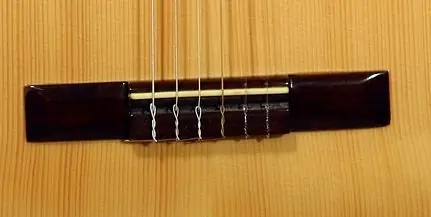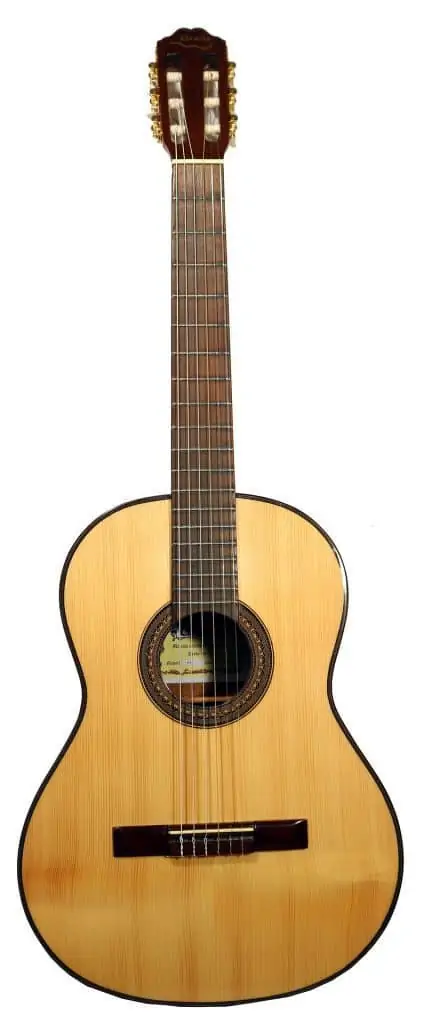Today’s battle? Nylon vs steel strings for guitar. This is a pretty common question people have when first starting out on the guitar. Or perhaps you’ve been playing on someone else’s guitar and want to get your own or need to buy new strings and aren’t sure which type of strings to get.
Ideally, this decision should be made before you purchase a guitar since guitars that support steel strings are different to those that use nylon strings. More on that later.
Another thing that guitarists like to keep in mind is the comfort level. Nylon strings are slightly easier on your fingers, but this isn’t a good reason to go that route. The biggest thing when it comes to deciding which type of strings you want is your preference.
But we’ll get into all the nitty-gritty, including the pros and cons, so that you can make an informed choice and start jamming in no time, whether you have nylon or steel strings.
Contents
What Tone Are You Looking For- Soft and Warm or Bright and Crisp?
I prefer that nice crisp and bright tone that comes from steel strings. Perhaps you would prefer a warmer, softer sound?
This is the main difference between the strings.
Nylon Strings- Soft and Warm
Nylon strings are softer and don’t have that bright tone that steel strings have. They are a little quieter, more mellow, and warmer in tone. You can hear what they sound like in this video:
Steel Strings- Bright and Crisp
Steel strings sound harsher compared to the mellow tones of nylon strings. By harsher, I mean that you can hear they’re made from steel and produce a crisp and bright tone. Here is a good example of what steel strings sound like:
In both videos, the songs were classical in style, but offer a great example of the differences in the tones.
What Genre do You Want to Play?
I put this below the tone, because as you saw, playing classical music on a steel-string still sounds good even though classical guitars (nylon-stringed guitars) are typically used to play classical music. You don’t necessarily have to stick to the norms if you don’t want to. What do you enjoy the sound of?
Having said that, there are genres that each type of string is better suited to:
Nylon Strings- Classical, Jazz, Flamenco, Folk
These three genres work really well with nylon strings. Classical guitars are wider at the neck so that there are bigger spaces between the strings. This allows precision to come a little more easily.
These types of music are also often played fingerstyle with long nails on the right hand.
Not that these guitars are never strummed. Spanish music has some brilliant and intense strumming that can only be described on my part, as awesome. The softer, more mellow tone sounds a little more intense to me than strumming on a steel string. You’ll have to judge for yourself.
Some people like to bust out pop songs on nylon strings too, but generally, steel strings are preferred for pop.
Steel Strings- Rock, Folk, Country, Pop, Blues
Steel strings are versatile and used in most genres. The sound just lends itself well to the above-mentioned genres. Sure, you can rock out on your nylon-stringed guitar. It can sound cool if you do it right. But it’s not going to have that traditional steely quality that rockers the world over enjoy.
While steel strings also work well in jazz settings, if you want to go the flamenco route, it’s going to be a little harsher than traditional flamenco.
It’s not necessarily bad, but it will definitely be different. It just depends on what exactly you’re aiming for. Personally, I just play whatever I feel like that day.
Why Strings Aren’t Generally Interchangeable
It’s not that it absolutely can’t be done, particularly if you want to put nylon strings on a steel-string guitar. It’s just going to be somewhat problematic and will require some tweaks to sort out. Nylon strings are mounted differently to steel strings for one. To further understand, you’ll need some knowledge of the guitars, specifically their construction, and strings too.
Steel Strings are Ball End Strings, Nylon Strings Aren’t
Steel strings have little balls on the end that are inserted into the guitar and held in place by bridge pins.
Nylon strings, however, are typically knotted into place on classical or flamenco guitars at the bridge. There are no little balls on the ends.
Steel String Guitars have Longer Necks
It’s not just that steel-string guitars come in a variety of shapes including cut-away and dreadnought. While classical guitars come in pretty much one shape. Steel-string guitars have longer necks to accommodate more frets. You may run into issues with nylon strings being too short.

Tension- Nylon Strings Require Less Tension
Steel-string guitars are built differently to classical guitars to accommodate the higher tension that steel strings need to be tuned to specific notes and sound good too.
Because nylon strings require less tension to reach the notes they’re meant to be tuned to, classical guitars are built to accommodate this. There is a danger of damaging a classical guitar if you put steel strings on it.
You may need to adjust the action on a steel string guitar to work better with the nylon strings. The height that the strings are from the fretboard is called the action.
Are Steel Strings Harder to Play on than Nylon Strings?
In short, yes.
Because of the higher tension, steel strings sit a little higher off the fretboard. You need to press down harder to make the notes ring out clearly. This can be adjusted but the nature of steel strings is that they are generally harder than nylon strings. They may hurt a little more to play in the beginning too.
Don’t let this put you off if you’ve made up your mind that you want to go for steel strings. Even nylon strings can make your fingers feel a little tender in the beginning. You’ll also build up the muscles in your hands and fingers just like you will with muscle memory. Your fingers will also form calluses and tenderness will be a thing of the past unless you play for hours at a time.
If your strings are still difficult to play and you’ve adjusted the action, you may need to choose a lighter gauge of strings. Thicker strings are harder to play on as they require more pressure to push down and bend. A lighter gauge will help with that although, if you like to strum vigorously, having a heavier gauge is better.
Electric guitars are also a little easier to play as the action is lower.
Nylon vs Steel Strings for Guitar – Pros and Cons
In summary, here’s what you need to know to make your decision.
The Pro of Nylon Strings
- They work well with jazz, classical guitar pieces, and flamenco guitar songs
- Nylon strings are more mellow sounding with a soft, warm tone
- The wider neck on the classical and flamenco guitars make precision easier
- Available for use on electric, semi-acoustic, and acoustic classical and flamenco guitars
The Cons of Nylon Strings
- They are a little quieter
- They go out of tune quicker as they are softer
The Pros of Steel Strings
- They are very versatile (pop, rock, bluegrass, blues, country, etc)
- They are louder than nylon strings
- Steel strings have that nice crisp, bright tone
- They stay in tune longer than nylon strings
- Available for use on electric, semi-acoustic, and acoustic guitars
The Cons of Steel Strings
- They are harder on your fingers
- Steel strings require more pressure from your fingers to play notes properly
Conclusion- Nylon vs Steel Strings for Guitar
The best advice I can give you, is to go with your preference. If you don’t have access to a steel-string or nylon-string guitar at home, go into an instrument shop and try out the guitars there.
You can hear which strings suit you best. Just bear in mind that guitars in these stores, particularly entry-level guitars, are rarely set up. The action might be a little high, so they can be harder to play.
The strings may also be cheap. I’m not against cheap strings if they sound good. But often, the price of strings reflect the quality of the sound they’ll produce. You don’t need to worry too much about this when you’re starting out. These strings will serve you well enough in the beginning.
When choosing a brand of strings to go with, read online reviews and check out reviews on YouTube, so you can hear what they sound like. Then you’ll also be able to find those value for money strings.
This is also an option if you don’t feel comfortable playing the guitars in the store. You can get an idea of what the guitars will sound like, keeping in mind that the environment you’re in affects the sound.
So think about what music you want to play and which strings you like the sound of. It’s not nearly as complicated as you think to choose between nylon and steel strings.
Most of all, have fun with this. Making music is about expression and about having fun, whether you’re playing by yourself, with others, alone, or in front of others.

Cheanné Lombard lives in the home of one of the new Seven World Wonders, Cape Town, South Africa. She can’t go a day without listening to or making music.
Her love of music started when her grandparents gave her a guitar. It was a smaller version of the full-sized guitars fit for her little hands. Later came a keyboard and a few years after that, a beautiful dreadnought guitar and a violin too. While she is self-taught when it comes to the guitar, she had piano lessons as a child and is now taking violin lessons as an adult.
She has been playing guitar for over 15 years and enjoys a good jam session with her husband, also an avid guitarist. In fact, the way he played those jazzy, bluesy numbers that kindled the fire in her punk rock heart. Now she explores a variety of genres and plays in the church worship group too and with whoever else is up for a jam session.





